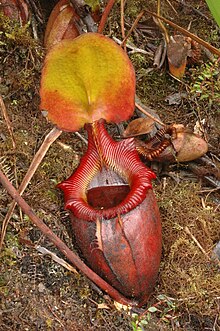Nepenthes × kinabaluensis
| Nepenthes × kinabaluensis | |
|---|---|
 |
|
| Large lower pitcher of N. × kinabaluensis from Mount Kinabalu | |
| Scientific classification | |
| Kingdom: | Plantae |
| (unranked): | Angiosperms |
| (unranked): | Eudicots |
| (unranked): | Core eudicots |
| Order: | Caryophyllales |
| Family: | Nepenthaceae |
| Genus: | Nepenthes |
| Species: | N. × kinabaluensis |
| Binomial name | |
|
Nepenthes × kinabaluensis Sh.Kurata ex Sh.Kurata (1984) |
|
 |
|
| Distribution of N. × kinabaluensis. | |
| Synonyms | |
Nepenthes × kinabaluensis /nɪˈpɛnθiːz ˌkɪnəˌbɑːluˈɛnsɪs/, or the Kinabalu Pitcher-Plant, is the natural hybrid between N. rajah and N. villosa. It was first collected near Kambarangoh on Mount Kinabalu, Borneo by Lilian Gibbs in 1910 and later mentioned by John Muirhead Macfarlane as "Nepenthes sp." in 1914. Although Macfarlane did not formally name the plant, he noted that "[a]ll available morphological details suggest that this is a hybrid between N. villosa and N. rajah". It was finally described in 1976 by Shigeo Kurata as N. × kinabaluensis. The name was first published in Nepenthes of Mount Kinabalu, but was a nomen nudum at the time as it lacked an adequate description and information on the type specimen. The name was subsequently published validly by Kurata in 1984.
The pitchers of N. × kinabaluensis may be quite large, but do not compare to those of N. rajah or N. × alisaputrana (N. burbidgeae × N. rajah). Nepenthes × kinabaluensis can only be found on Mount Kinabalu (hence the name) and nearby Mount Tambuyukon, where the two parent species occur sympatrically. More specifically, plants are known from a footpath near Paka Cave and several places along an unestablished route on a south-east ridge, which lies on the west side of the Upper Kolopis River. The only accessible location from which this hybrid is known is the Kinabalu summit trail, between Layang-Layang and the helipad, where it grows at about 2900 m in a clearing dominated by Dacrydium gibbsiae and Leptospermum recurvum trees. Nepenthes × kinabaluensis has an altitudinal distribution of 2420 to 3030 m. It grows in open areas in cloud forest.
...
Wikipedia
